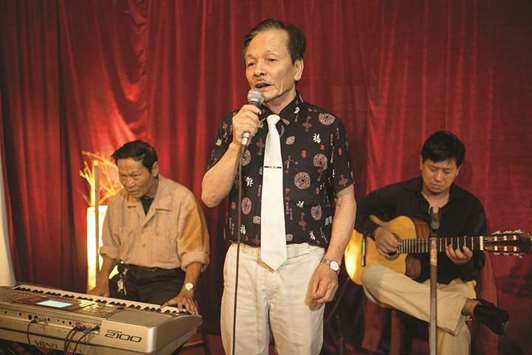In a smoke-filled cafe near Hanoi’s West Lake, the elderly Nguyen Van Loc sings old love songs to a well-dressed crowd.
The lyrics – whose English translations would not be out of place in a Frank Sinatra song – once earned him nearly a decade of hard labour during the Vietnam War on charges of subversion.
While Vietnam’s single-party communist state has since come to accept what it once pejoratively called “yellow music,” the traditional love songs from the pre-war era previously were banned for decades.
The genre, named in contrast to the officially sanctioned revolutionary “red music,” was deemed “counter-revolutionary” at a time when pre-war culture was shunned.
Love songs, with their tender sentimentality standing in stark contrast to revolutionary fight songs, were particularly reviled.
Now 72, Loc says that all he wants is his honour back.
“I’ve sacrificed everything to regain my old honour and to defend my music. I’ve paid a high price for my passion and my love,” the musician says.
Ngoc Dai, a famed contemporary Vietnamese musician, calls Loc a “rare and talented” legacy of a past era. “Yellow music has a very important position, a bright point in our musical history, transmitted to this generation from others despite the fact that it used to be considered ‘hostile music,’ “ he says.
Born in 1945 during the twilight years of French colonialism, Loc came of age in communist North Vietnam during the war.
At age 20, in the year of the first major land battle between US and North Vietnamese forces, Loc began a cover band with two friends that played pre-war love ballads.
“We were very young and didn’t have any opinion about politics, we only had passion for music,” says Loc.
Using old guitars they bought at a flea market, the three performed at their Hanoi homes late into the night over tea and cigarettes.
Only close friends were invited. The doors were kept shut, lest neighbours report them for playing yellow music.
While the lyrics sang only of young love, the regime considered them decadent throwbacks tainted with capitalism.
“All the old masterpieces of literature, the arts – they considered them bad products from the ancient regime,” says Loc.
Loc and his friends managed to maintain their secretive act for three years until they were found out in 1968 for reasons not entirely clear.
All three were convicted for “attacks on the culture of socialism,” with Loc receiving a 10-year sentence consisting of solitary confinement and forced labour.
But his luck began to turn in 1973 with the signing of the Paris Peace Accords.
While it would be another two years before Vietnam’s reunification, Hanoi’s tide towards victory resulted in a sentence reduction for Loc.
He was released in 1976, got married and had a son, who inherited his father’s love of music and today teaches guitar at the Hanoi Conservatory of Music.
In 1986, Vietnam initiated its first series of reforms, and Loc saw an opening back into performing.
With Vietnamese totalitarianism becoming more lax, songs previously shunned as yellow were rebranded as “pre-war” music, to be celebrated as cultural artefacts.
But Loc’s status as a former political prisoner continues to haunt him and his bandmates. One of them died homeless in 2004, while another gave up singing and lives anonymously in Hanoi.
Loc tried throughout the 1990s to establish a venue where he could sing but was thrice thwarted by authorities. He was finally allowed to open his cafe in 2008. Its name, Loc Vang, means “Yellow Loc.”
He now attracts a mostly elderly crowd, although Loc said younger “intellectuals” also come to his thrice-weekly performances.
Cuong Anh, a 45-year-old electrical engineer and regular at Loc’s shows, says he loves the subversive symbolism Loc had come to represent.
“I love him for his stand against the power of communism, which outlawed and imprisoned him for singing songs, even though [they’re] just purely about love,” says Anh.
“He could not stand the songs that were made for the ‘revolution,’ that had no true love, true romance, but to inspire war,” he adds.
But even though the songs’ composers are now officially celebrated, Loc says he has never received an apology from the government.
A show in Ho Chi Minh City – his first ever scheduled in the former South Vietnam – was forcibly cancelled by authorities in March 2017.
“One question I have for the government is, why do all the composers who wrote such music get honoured, and why did I, who only sings their music, lose my honour and get nothing?”
“I only want to get back my honour,” he says. - DPA

Nguyen Van Loc, singer and former political prisoner, sings at his small Hanoi cafe to a crowd of mostly elderly Vietnamese.
